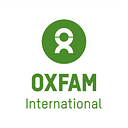‘One Hand Washes The Other’ — In a Time of COVID-19 We All Need to Lend a Hand to Help Those Most in Need
To stop COVID-19 in your country we must stop it in all countries. In times of crisis we must put humanity first.
Global Pandemics are frightening. It is natural and entirely right that each and every one of us is very worried about our own health and that of our families and are taking every precaution we can to protect them.
We wash our hands and practice good hygiene with trust and faith that every other person is doing the exact same thing — friends depending upon friends, neighbours upon neighbours, communities upon communities.
Countries upon countries.
The declaration by the WHO that COVID-19 is a pandemic was highly significant instruction to us that this is not a crisis that can be dealt with one country at a time. To stop COVID-19 in your country we must stop it in all countries.
You cannot build a wall to keep COVID-19 out, you have to fight it in every community, and the poorest communities will need the most help lest they become a reservoir for the virus even after the rest of the world has contained it.
In times of crisis we must put humanity first.
Moments of crisis define our collective humanity, and it is in caring for others that we are truly at our best. That may mean checking in on elderly neighbours, and taking care of the children of others who can’t work from home — these small kindness can make all the difference at a time like this.
But we must also remember the millions of people who have no support at all; those who have fled war, women going without food so their children can eat during droughts, those who have no access to healthcare, those living in camps, those who can’t stockpile food or medicines because they don’t have access to them in the first place.
In the absence of a CV-19 vaccine, washing hands is the most effective means of keeping the virus at bay, but in over-crowded refugee camps such as Moria in Lesbos, there is little sanitation and no hope of social distancing.
Health systems in conflict affected countries are badly under-resourced, water and sanitation facilities are desperately lacking and public information on virus prevention is extremely difficult.
South Sudan has on average a single doctor for every 65,574 people and in Syria there have been over 444 attacks on medical facilities during the conflict. If and when COVID-19 takes hold in such countries it will be all but impossible to contain and quarantine affected people and increasingly unlikely patients will get the hospital care that we know many are likely to need.
The good news is that there is still a chance to stop it, if we act now.
Syria, Yemen and South Sudan have not yet reported cases of Covid-19. (This does not necessarily mean there are not cases in those countries, as the overstretched healthcare systems may struggle to detect cases.) DRC, Nigeria, Cameroon, Afghanistan, Iraq and other conflict-affected states have all begun reporting cases but if we can improve water and sanitation services, it may still be possible to limit the spread.
To do this we need to dramatically increase humanitarian services to these countries and to urgently provide water and sanitation facilities so that people can take the most basic — and perhaps the most important — step for preventing the spread of the virus; washing their hands.
Oxfam, together with other international and local organizations, is working to provide water and sanitation services, and promote better health practices for people in the most vulnerable conditions. From the refugee camps of Bangladesh to the displaced communities across the Horn of Africa, we are working to meet needs and help people live lives of dignity, but we need the support of the international community to do this.
While every state must do whatever it can to help its citizens, we must also remember that an international outbreak requires an international response and we cannot afford to ignore those who are already in humanitarian crisis.
This entry posted 16 March 2020, by Mathew Truscott, Head of Policy, Rights in Crisis, Oxfam
